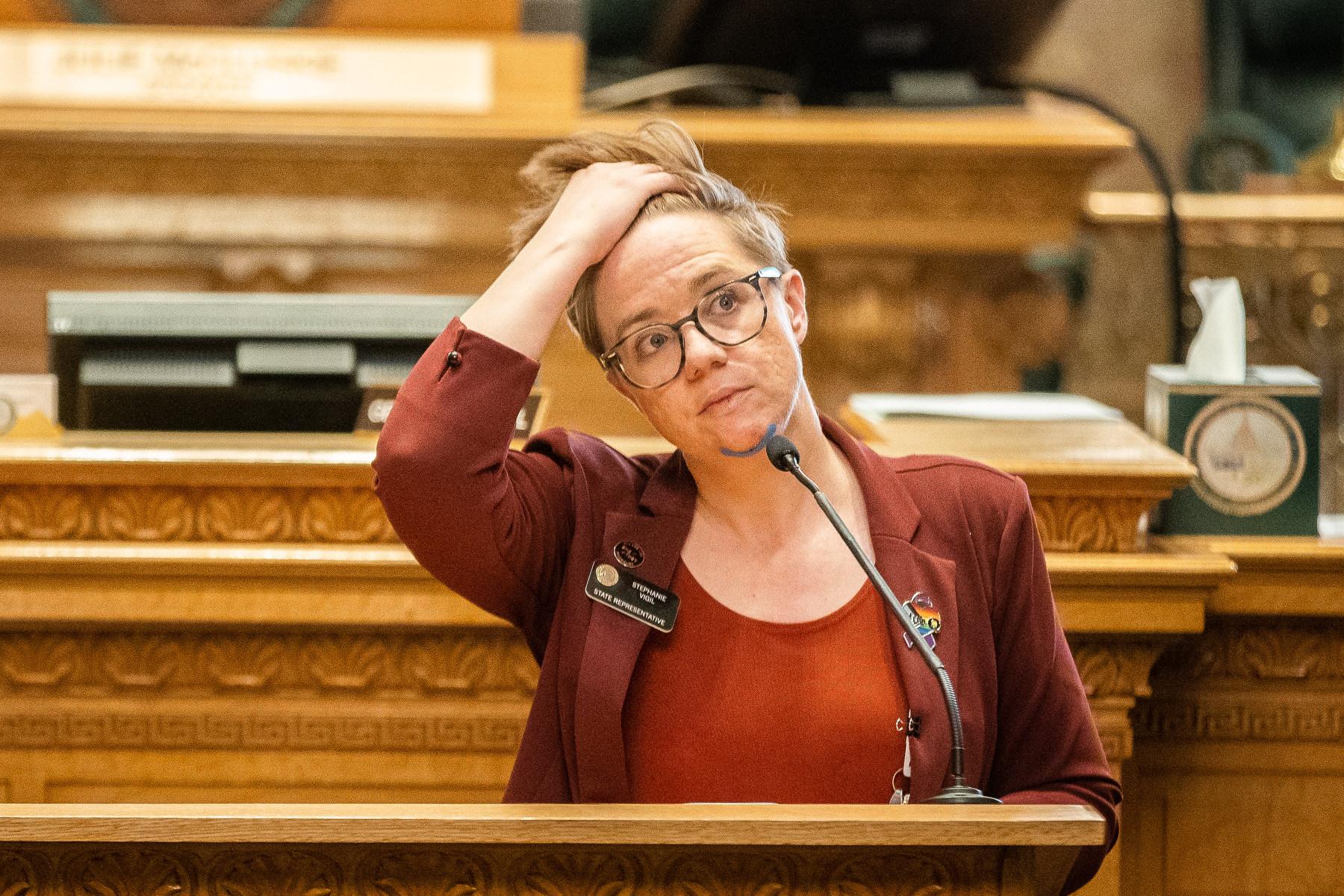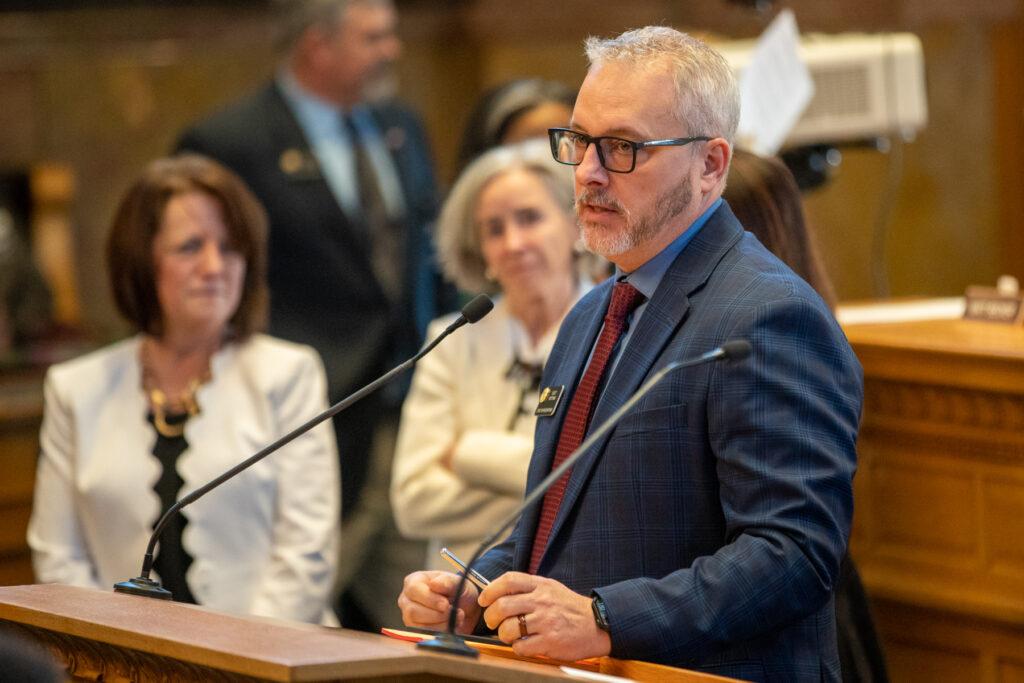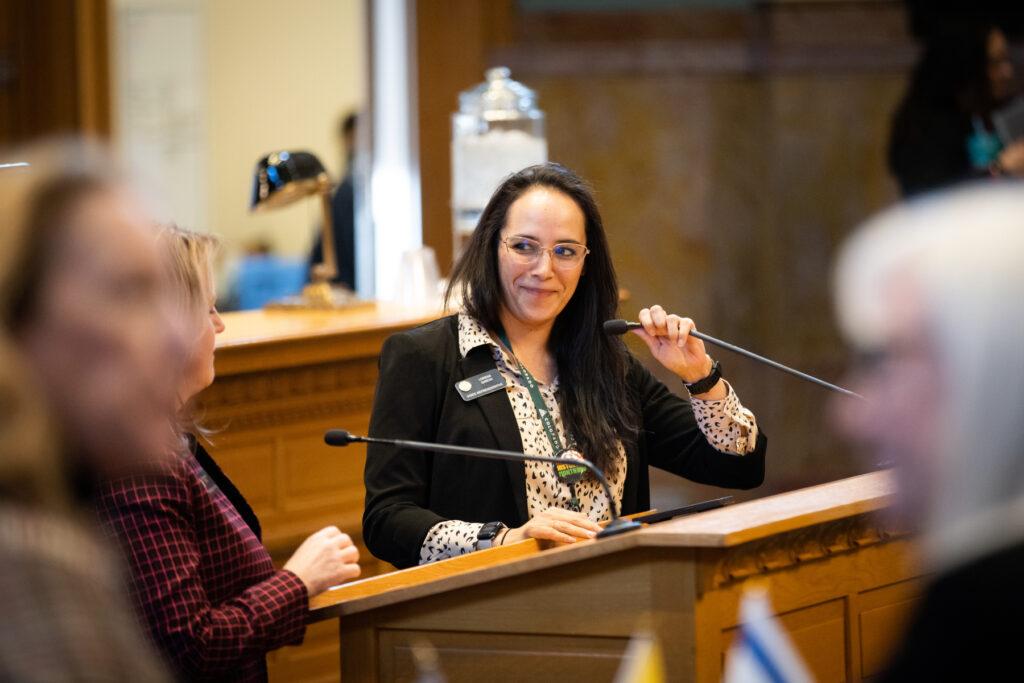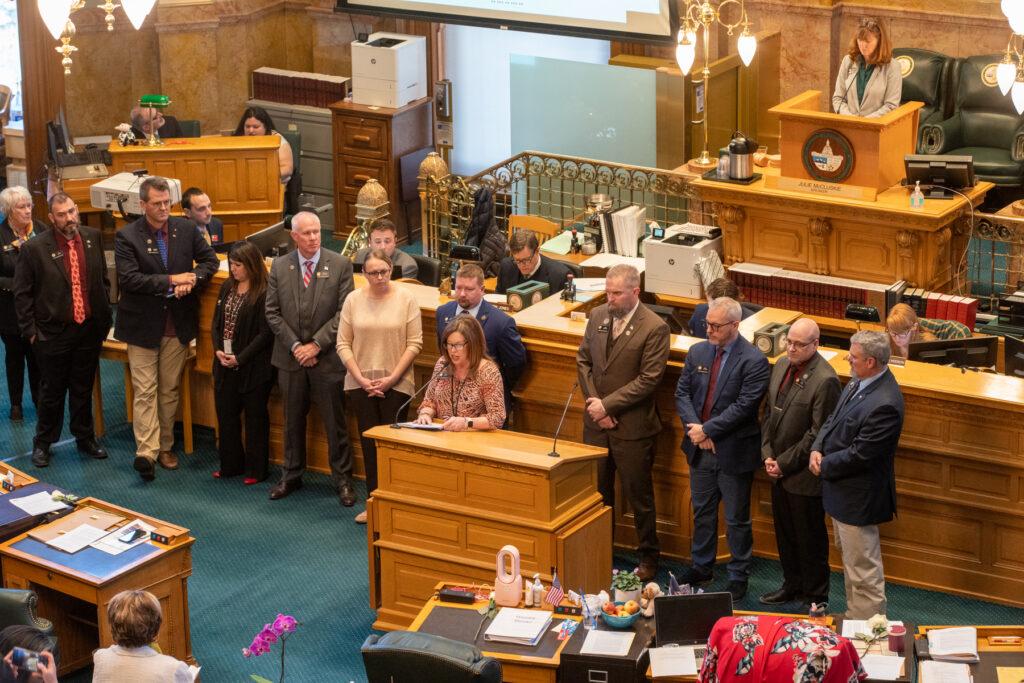
Update: Both bills won preliminary approval in the House late Friday afternoon. They will need one more vote before heading to the state Senate.
The Colorado House’s commitment to decorum and civility could get its first big test of the legislative session on Friday, when the full chamber is scheduled to debate two bills related to transgender rights.
One proposal aims to make it easier for transgender people with felony records to legally change their names to conform with their gender. The other would require K-12 schools to have written policies for using a student’s chosen name and pronouns.
Bills that touch on trans rights — especially those of trans youth — are politically fraught at the state Capitol. These floor debates come on the heels of a week of acrimonious social media back-and-forths over an entirely separate bill related to child prostitution, which has served to further increase tensions.
“We continue to work on our decorum,” said Democratic Speaker of the House Julie McCluskie.
For the two Democratic bills up for a vote Friday, each cleared its respective House committee on a party-line vote, and both hearings went relatively smoothly. But some Democrats worry about what could happen in the more freewheeling venue of a floor debate, where lawmakers are typically allowed unlimited time to speak.
Republican state Rep. Scott Bottoms of Colorado Springs, an evangelical pastor whose district is based in Colorado Springs, has characterized the fight on trans rights and the unrelated child prostitution bill in existential terms.
“We are fighting truly dark forces here. This is not okay. This is evil stuff that we're dealing with,” he said in an online video last week.

He told CPR News that both of the trans bills are harmful.
“It's going to be a big issue here on the floor. We're not okay with either one of these bills. Our entire caucus is not okay with either one of these bills,” he said. “If I say this is unconstitutional and immoral, which I will, and people don't like that, then it becomes contentious. I think to shove both of these bills in our face is very contentious. They're wrong on so many levels.”
Bottoms was privately reprimanded last year by Speaker McCluskie for what she described as disparaging comments he made about Democratic lawmakers at a town hall. In her letter to his leadership, she said that incident followed several objectionable remarks he made in the chamber last session, and she directed Bottoms to additional training on the legislature’s workplace expectations.
Democrats hold their widest House majority in Colorado history, but have grappled in recent years with where to set the boundaries for acceptable speech in the chamber.
McCluskie said she talked to her members and recently met with Republicans to discuss appropriate behaviors while debating bills. Democratic House leaders are still working to finalize a memo to more clearly outline best practices for how to act in the chamber, as well as how to de-escalate situations and consequences when someone does cross the line.
The legislature already has a workplace policy and procedures for filing claims on harassment or a hostile workplace, but it has not traditionally been interpreted as covering remarks made during a floor debate or social media posts.
“I will continue to lean in to ensure that we protect both our members, but also the respect and civility of the workplace,” McCluskie said.
For Colorado Springs Democratic Rep. Stephanie Vigil, the sponsor of the student names bill, “avoiding the biggest trigger words is important in here. ‘Groomer,’ ‘pedophile.’ I think just anything that seems to be leveling an attack at the entire community.”
The term “grooming” is used to describe how child molesters entrap and abuse their victims, but in recent years has been co-opted and used by opponents of the LGBTQ community.
Some of the supporters of the trans rights bills are holding a rally at the Capitol on Friday and plan to be inside the House chamber’s public viewing gallery to observe the floor debate. The moment comes at a particularly challenging time, following the death of a nonbinary teen in Oklahoma whose parents say was bullied over their gender fluidity.
Hearings had raw moments, but stayed generally civil
House bill 1071 is also known as “Tiara’s Law” for Tiara Latrice Kelley, a Black transgender woman who lives in Colorado Springs. Kelley has a felony conviction in Florida related to charges from sex work two decades ago.
The bill’s hearing in the Judiciary Committee last month had one particularly tense moment, when an opponent was ejected after swearing and trying to speak over the chair. She also misgendered and deadnamed Kelley by calling Kelley the name she used prior to transitioning.
“The sergeants came in to escort her out. She was still yelling, calling everyone cowards and that we all need therapy and really targeting the trans community that was there to testify,” said Democratic state Rep. Lorena Garcia of Adams County, the bill’s sponsor.

Opponents said they’re concerned the bill would allow felons to essentially mask their criminal histories. Those in support disagreed, noting any felony conviction would still be linked to an individual's social security number and fingerprints, regardless of a legal name change.
In an interview with KRCC, Kelley said she was satisfied with how lawmakers handled the disturbance.
"[Their actions] really proved to me that Colorado and our legislators here are not going to allow transgender people to be disrespected," she said.
Kelley said the incident hasn't deterred her from returning to the Capitol to push for policies she backs. She plans to attend Friday's rally.
"If anything, it encourages me to go back more because it reminds me that there are people that are actively fighting against human rights,” she said.
The other measure up for debate Friday, House bill 1039, tries to address the question of whether K-12 schools should be required to use students’ chosen names on unofficial documents such as rosters and student IDs, without a legal name change or parental notification. The bill originated from a youth advisory council composed of high school students from across the state.
During the hearing, the rights of parents, and whether schools should have to inform them about their child’s chosen name, came up repeatedly.
Supporters said the measure would save lives by affirming the identity of trans youth in schools, while opponents worried it would infringe on parental rights and allow young people to make important life choices without family guidance.
State Rep. Vigil said she was flooded with emails and threats after the far-right anti-LGBTQ social media account, Libs of TikTok, posted about it.
“It's not harmless to go around accusing people of violent crimes against children and waiting for people to hurt somebody over it,” she said.
The three-and-a-half-hour Education Committee hearing for Vigil’s bill was by and large respectful. She said the panel approached the hearing intentionally, knowing that some people might show up to “create drama.”
“The chair, I think, did a good job of being upfront — ‘here's what we expect in this room, right? Speak your peace. We're not going to be disrespectful to each other. We're also going to have some grace if someone just makes a mistake or isn't sure what word to use,’? said Vigil.
When it comes to Friday's floor debate, Vigil is bracing for a long day.
Debate comes after death threats around child prostitution bill
As they get set to take up the two trans rights bills, House members are also in the midst of dealing with what’s acceptable online speech, sparked by social media posts stemming from Republican state Rep. Brandi Bradley of Douglas County.
Last week, Democrats on the State Veterans and Military Affairs Committee voted down a bill sponsored by Bradley and Democratic Rep. Regina English of Colorado Springs that would have set a mandatory minimum sentence for various crimes related to child prostitution.
Supporters of House bill 1092 said it was a straightforward and critical policy to crack down on those who victimize prostituted minors. But some of the Democrats on the panel questioned whether it would result in fewer victims or better enforcement, and others said they were concerned it could sweep up people who are victims themselves.
After the vote, Bradley wrote that Democrats voted to “let pedophiles roam the streets and prey on our children.” In one post she singled out two committee members in particular, Democratic Reps. Elisabeth Epps and Jenny Willford.
“Bullying + demonizing people who disagree with you is why politics is so polarized and ugly. I don’t accept your abusive behavior, Brandi. It’s toxic. Be well. Do better,” Willford replied.
Speaker McCluskie said she was disgusted by what she saw online around the child prostitution bill.
“I believe that as an elected official, the bully pulpit is a privilege and not to be used to disrespect, to target hate against individuals, whether it be your colleagues in the chamber or witnesses who show up to testify in committee,” McCluskie said.
She said her office has contacted Colorado State Patrol over threats related to Bradley’s bill, as well as the trans rights measures. McCluskie said none of the threats came directly from members, and characterizes some of them as online posts including images.
“Threatening photographs of nooses and wood chippers with statements attached and that kind of hate belongs nowhere, I would say nowhere, in our society,” said McCluskie. “It is unacceptable to me that people behave like that on social media.”
Bradley defended her posts and said if Democrats are receiving death threats it’s because of their votes, not her comments.
“We have people on social media that advocate for dangerous things. I haven't liked a single comment that was calling for a wood chipper or a noose,” Bradley told CPR. “I don't think I was inciting threats. I think that you can publicly speak out about a vote that was horrific and is not going to do justice for children.”

House Minority Leader Rose Pugliese said her caucus is having conversations about how to make sure disagreements don’t derail productive discussions on policy.
“I think there is a way to disagree and there's a way to bring these issues to the table. And that's what we're trying to navigate right now,” Pugliese said.
But she was firm that she will not try to regulate what Republican lawmakers say in the chamber, or write online.
“All of our elected officials on both sides have a First Amendment constitutional right to free speech, and we support that. We don't control our members.”









